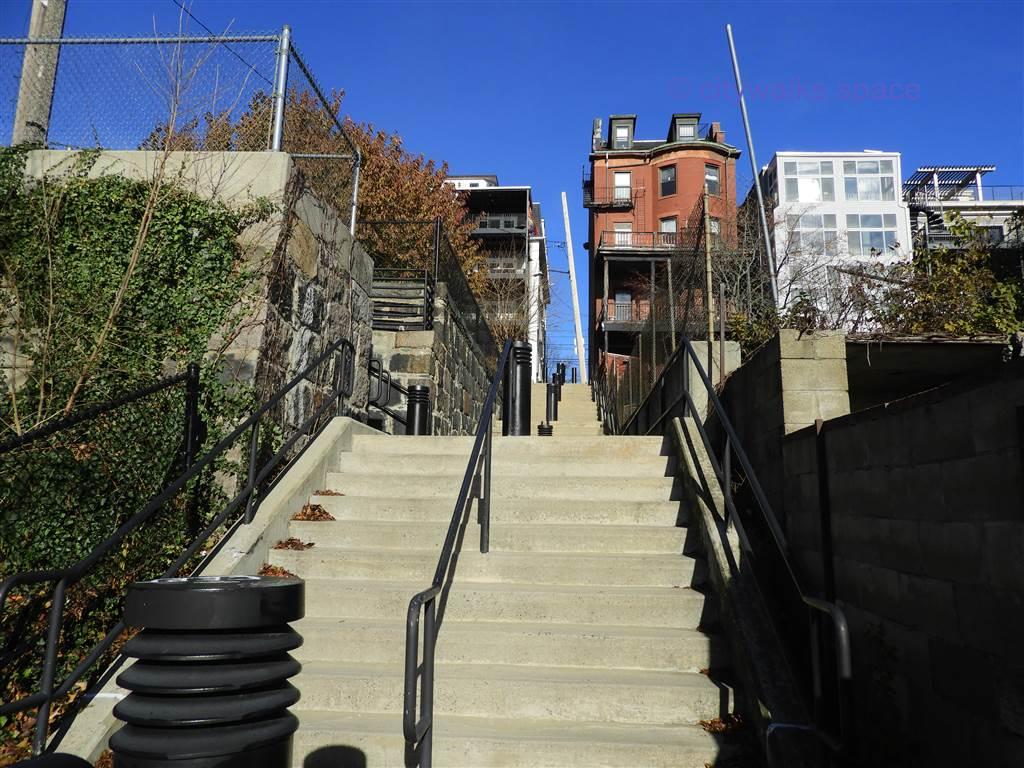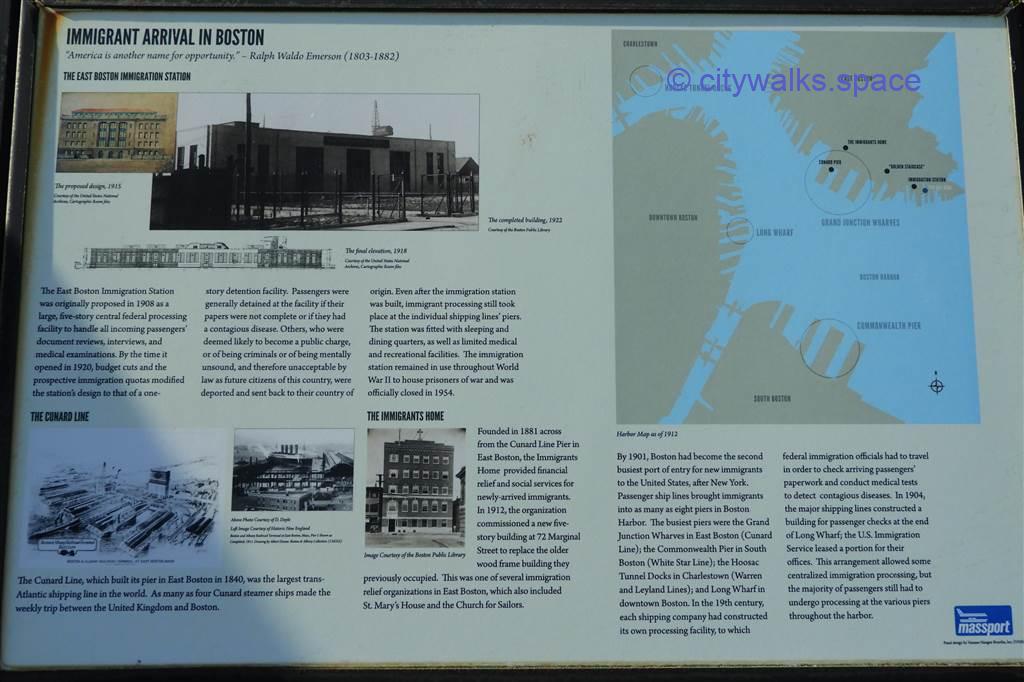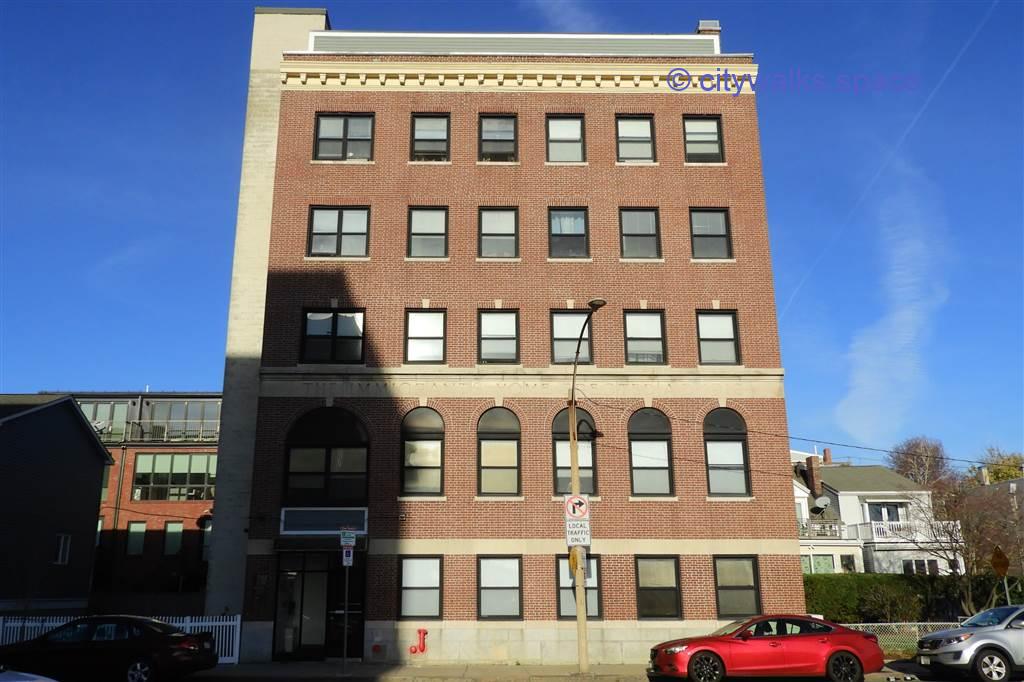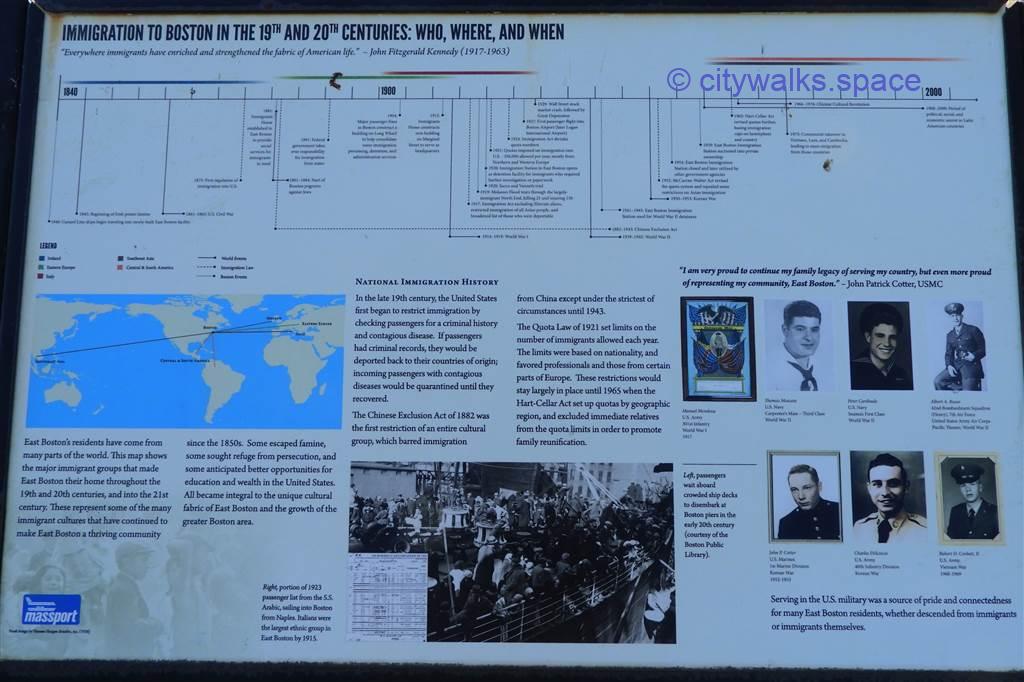

(texte en français ci-dessous)
The Gloden Stairs | Boston immigration
Even if Ellis Island in New York harbor is the symbol of immigration to the USA during the end of the 19th century and the beginning of the 20th, Boston was at that time the second point of entry into American territory.
There were up to 8 landing wharfs for passenger boats coming from Europe, each with its immigration station and federal agents going from one to another to check papers and administer medical tests.
That of Grand Junction in East Boston – where Piers Park is now, was the most important and it is therefore also in East Boston that you can still find the most remnants of this activity.
First, the explanatory panels located at Piers Park and Navy Fuel Park which give you an overview of what immigration was like at the time (see the photos on this post).
Then, along Marginal Street and opposite to Piers Park 2, the Immigrant House whose name you will still find on the facade if you look up at the 3rd floor.
Along with two other establishments that seem to have disappeared, it provided social services for newcomers.
In what is now part of the Boston Harbor Shipyard and across from Navy Fuel Park, there is the remains of the immigration station.
Finally, along Ruth Street, you’ll find The Golden Stairs so named because once the immigrants had successfully passed the formalities of entry to the New World, they climbed their steps to reach the opportunities that the city or the territories further west were supposed to offer them.
You can always take them and you will arrive at the Golden Stairs Terrace Park from where you will have good views of Boston – although less open than from Piers Park.
For the rest, the future will tell you if it helps you find the promised gold!
External links:
- Walk in Boston # 3, the old and the new East Boston: part of the walk takes you through all the places described in this article and allows you to climb the famous Golden Stairs.
- East Boston Wikipedia page: for more on the history of the neighborhood.


Les escaliers d’or | l’immigration à Boston
Même si Ellis Island dans le port de New York est le symbole de l’immigration aux Etats-Unis d’Amérique de la fin du 19ième et début du 20ième siécle, Boston fut aussi à cette époque le deuxième point d’entrée sur le territoire américain.
Il y eu jusque 8 pontons de débarquement pour les bateaux de passagers venant d’Europe, chacun avec sa station d’immigration et des agents fédéraux allant de l’un à l’autre pour vérifier les papiers et faire passer les tests médicaux.
Celui de Grand Junction à East Boston – là où se trouve maintenant Piers Park, était le plus important et c’est donc aussi à East Boston que l’on trouve encore le plus de traces de cette activité.
D’abord les panneaux explicatifs situés à Piers Park et Navy Fuel Park qui donnent un aperçu de ce qu’était l’immigration à l’époque (voir les photos de cet article).
Ensuite, le long de Marginal Street et en face de Piers Park 2, la Maison des Immigrants dont vous verrez encore le nom sur la façade si vous levez les yeux vers le 2ième étage.
Avec deux autres établissement qui semblent avoir disparus, elle procurait des services sociaux pour les nouveaux arrivants.
Dans ce qui fait maintenant partie du chantier naval du port de Boston et en face du Navy Fuel Park, il y a les restes de la station d’immigation.
Enfin, le long de Ruth Street, vous trouverez Les Escaliers d’Or (the Golden Stairs) ainsi nommés parce qu’une fois que les immigrants avaient passé avec succés les formalités d’entrée au Nouveau Monde, ils montaient leurs marches pour atteindre les opportunités que la ville ou les territoires plus à l’ouest étaient censés leur offrir.
Vous pouvez toujours les emprunter et vous arriverez au Golden Stairs Terrace Park d’où vous aurez de belles vues de Boston – bien que moins dégagées que depuis Piers Park.
Pour le reste, l’avenir vous dira si cela vous permettra à vous aussi de trouver l’or promis !
Liens externes:
- Promenade à Boston numéro 3, l’ancien et le nouveau East Boston, une partie de la promenade vous fait passer par tous les endroits décrits dans cet article.
- Page Wikipedia sur East Boston: pour en savoir plus sur l’histoire du quartier.
Renee Scalfani
Dominique Lecomte